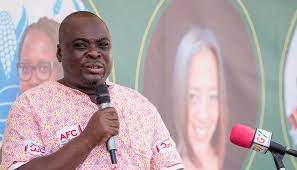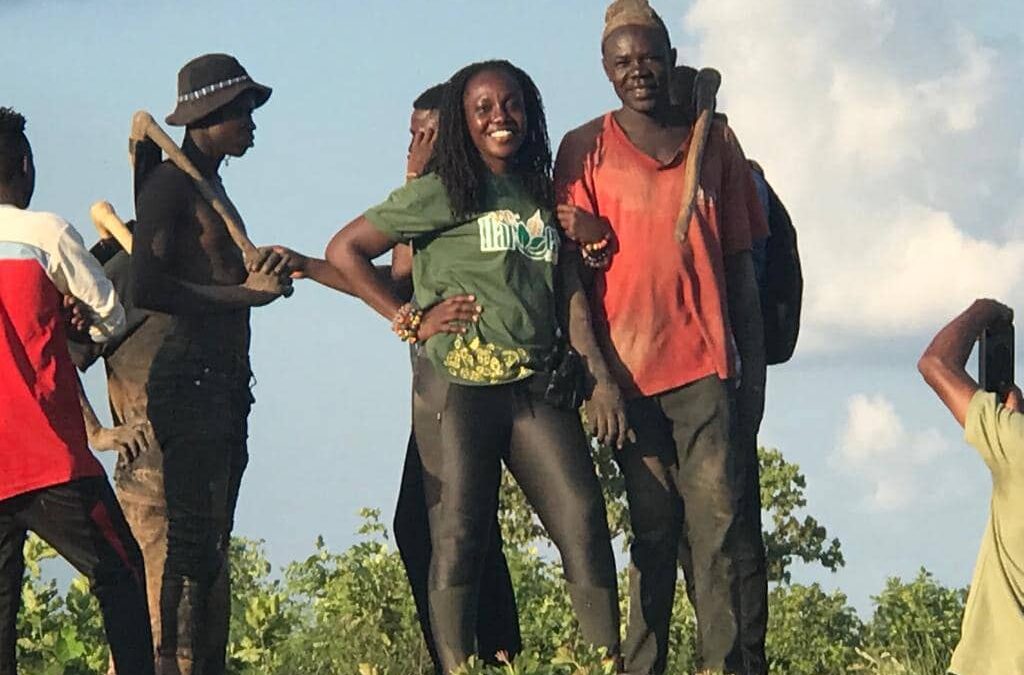
by Bismark | Dec 11, 2023 | Article, News
Our earlier news story titled “Cassava – Ghana’s Next Gold Mine,” has generated thoughtful conversations, with sound feedbacks, responses and submissions, from industry players, among whom include Cassava farmers, Processors, Academia, Development agencies, investors, researchers, beginner agribusinesses, individuals who desire to explore opportunities within value added cassava, and many others.
With this development, we decided to look at another phase and angle of the news story, by engaging stakeholders, to determine, if they agree with our assertion, that CASSAVA – IS GHANA’S NEXT GOLD MINE! And with the necessary attention and focus for growth, cassava could indeed become Ghana’s next cocoa and gold mine.
Cassava, despite its potential to significantly contribute to the country’s economic growth, often remains overshadowed by traditional agricultural giants like cocoa and gold.
The staple consumed in many Ghanaian households, silently awaits its emergence as an economic powerhouse. Unfortunately, we are all yet to fully wake up to understand and appreciate the economic windfall that this humble crop can bring.
Ghana is unintentionally missing substantial economic benefits and value addition that cassava could offer.
This versatile crop, capable of boosting revenue streams, lacks the serious consideration and prioritization given to other key and few commodities.
Edwin Siaw, a media practitioner in the Eastern shared that, beyond its economic potential, cassava offers a treasure trove of health benefits.
Recognized for its nutritional richness, cassava provides essential vitamins and minerals.
Additionally, it is known for its potential in preventing and treating certain health conditions, making it a valuable ally in the quest for improved well-being.
We also collectively agree, that cassava boasts a wide array of industrial applications, from pharmaceutical uses to the production of starch and biogas.
Cassava proves to be one of the most easiest to cultivate, a versatile crop with far-reaching benefits, playing a pivotal role in various industrial processes.
However, the growth of the cassava industry faces impediments that stifle its full potential.
The absence of enhanced efficiency machinery, equipment, technology and value addition initiatives and innovations, presents a significant hurdle, preventing the industry from flourishing.
There exists a noticeable gap between acknowledging cassava’s potential and taking concrete steps to unlock its benefits.
Then, we ask? –
Is the slow paced-growth of the cassava industry, have anything to do with Knowledge Gap, lack of information on the prospects or our own attitude to research further and apply an intensive hands-on approach, on how we can exploit the full potential?
Have we thought about what the positives and the impact will be, for our nation, if the youth, women, beginner agribusinesses, investors, etc, are able to grip it?
We commend the women, young ones and many number of individuals, and private companies, who are doing so much within the value added cassava space.
Our Governments have equally taken commendable steps to advance cassava production, exemplified by the establishment of notable, but not-so-functional cassava factories like Ayensu Starch Factory in Awutu Bawjiase, in the Central Region.
There is also CH Global Limited, a cassava and yam processing factory operating under the government’s 1-District-1-Factory initiative, located at Addo Nkwanta in the Krachi East District of the Oti Region and Global Almas Processing Ltd, situated in Bimbilla, Northern Region among others .
Despite these significant developments, it is imperative to acknowledge that there remains substantial work ahead in fully realizing the potential of cassava production in the country.
In a bid to advocate and champion cassava’s cause and draw attention to its untapped potential, Agrihouse Foundation has embarked on an initiatives to bring cassava to the forefront of the agricultural agenda. Holding the franchise for the International Cassava Fair in Brazil, Agrihouse foundation ,orchestrated a delegation visit to Brazil, exposing delegates to global advancements in cassava cultivation, varieties, value chain addition, machinery, and equipment, among other applications.
In our conversation with key figures in the cassava industry, Mr. Daniel Okyere, a farmer and owner of East Midland Farms in Begoro, echoed sentiments, emphasizing that cassava is a crop with immense economic potential, yet Ghana is not fully capitalizing on it.
He pointed out the hurdles faced by farmers who rely on manual tools like cutlasses, highlighting challenges in acquiring more land due to the current land tenure system in Ghana. Mr. Okyere lamented the reluctance of banks to provide loans, stating that the government’s support has primarily come through extension officers.
Expressing the need for significant policy changes, Mr. Okyere urged the government to implement measures supporting cassava farmers, including policies for acquiring machinery and facilitating access to loans for production. He proposed that the government should follow a model similar to the support given to cocoa farmers, suggesting the purchase of locally processed cassava products, such as gari, for schools.
Madam Abigail Ghama, a farmer celebrated for winning the Best Extension Volunteer award in 2013 at the Farmer’s Day in New Juaben North and later receiving the She Innovates Award from Agrihouse Foundation in the Eastern Region in July 2023 at Agrihouse Foundation’s Gold in the Soil Awards, highlighted the challenges faced by cassava farmers. She emphasized the difficulty of using traditional tools like cutlasses and hoes due to the lack of modern machinery for planting.
Madam Abigail Ghama urged the government to consider establishing a funding source specifically for acquiring machinery in cassava production. According to her, this would greatly enhance efficiency and productivity in cassava farming.
Adding her voice, Ivy Edith Opare Yeboah, the Managing Director of Lexvee Agro Processing Ltd situated in the Fanteakwa South District, who specializes in gari processing. Highlighting the significance of cassava, she notes that it constitutes approximately 80 percent of the food consumed in Ghana. Despite its vital role, Ms. Opare Yeboah encounters challenges in accessing raw materials and strongly urges the government to establish robust market linkages with the cassava sector.
In her perspective, the cassava sector holds immense untapped potential, yet both the government and Ghanaians are not fully capitalizing on its benefits. Ms. Opare Yeboah emphasizes that, with proper support and strategic initiatives, the cassava sector can significantly contribute to the country’s food security and economic development. Unfortunately, she points out that the sector currently lacks the much-needed support from the government.
Ms. Opare Yeboah suggests that allocating a dedicated sector to cassava would not only streamline access to raw materials but also provide a platform for comprehensive support and investment.
CALL TO ACTION: Alberta Nana Akyaa Akosa, the Executive Director of Agrihouse Foundation, is resolutely dedicated to learn more, explore further and use that, to contribute to instigating change.
Driven by a vision infused with passion and an unwavering belief in the transformative capabilities of cassava, she underscores the vital necessity for collaborative endeavors.
Ms. Akosa urges the government, private sector, and agricultural stakeholders to unite in implementing sustainable policies and initiatives. Her vision extends towards a future where cassava not only thrives as a pivotal economic contributor in Ghana but also uplifts the nation’s agricultural panorama to unprecedented levels of prosperity.
“I aspire to witness a future where cassava not only emerges as a crucial economic force in Ghana but also stands as a beacon of prosperity for farmers; our women, youth, etc
I also aspire to witness a time, where we have all the needed innovations, technology, appropriate and affordable machinery, equipment, input that would build speed and efficiency.
I also desire to witness a period, where the knowledge gap, will be bridged and our young women farmers, mothers, youth, beginners, family farmers, can appreciate, understand, and learn more about how they can grow their cassava enterprises, through value addition.
My utmost desire is for the industry to get to a stage, where all equipment, input, logistics, etc, will not only be for the privy of a “select connected group”, but will be accessible and affordable for all.
That is the only time, when we can gladly beat our chest. A time when we are fulfilled of making impact for the ultimate growth of a happy and content nation.
Through strategic knowledge acquisition, research and investments in modern machinery, promotion of value addition initiatives, and mind-set shaping, can unlock the full potential of cassava.
We shall continue to persist in passionately advocating for the recognition and prioritization of cassava, envisioning it as a cornerstone in the country’s pursuit of agricultural excellence and economic prosperity.
With all the growing interest and conversations around cassava, after our earlier news story, I personally remain steadfast, to commit to further learnings of all the potentials other crops possess – ONE AT A TIME!, after we fully absorb Cassava.
This way, we can continue sharing through this medium, all of the many potentials and opportunities that we can tap into, to build a career path in Agribusiness, generate additional revenue, attract investor drive, stakeholder interest and Government’s attention
The cause and the purpose, is to advocate and champion growth of value chain actors, growth of the sector as a whole, that will transform lives, make us better people, and bring a high level of security and satisfaction, to us, as a people!
I remain yours in the development of Agriculture!
Alberta Nana Akyaa Akosa
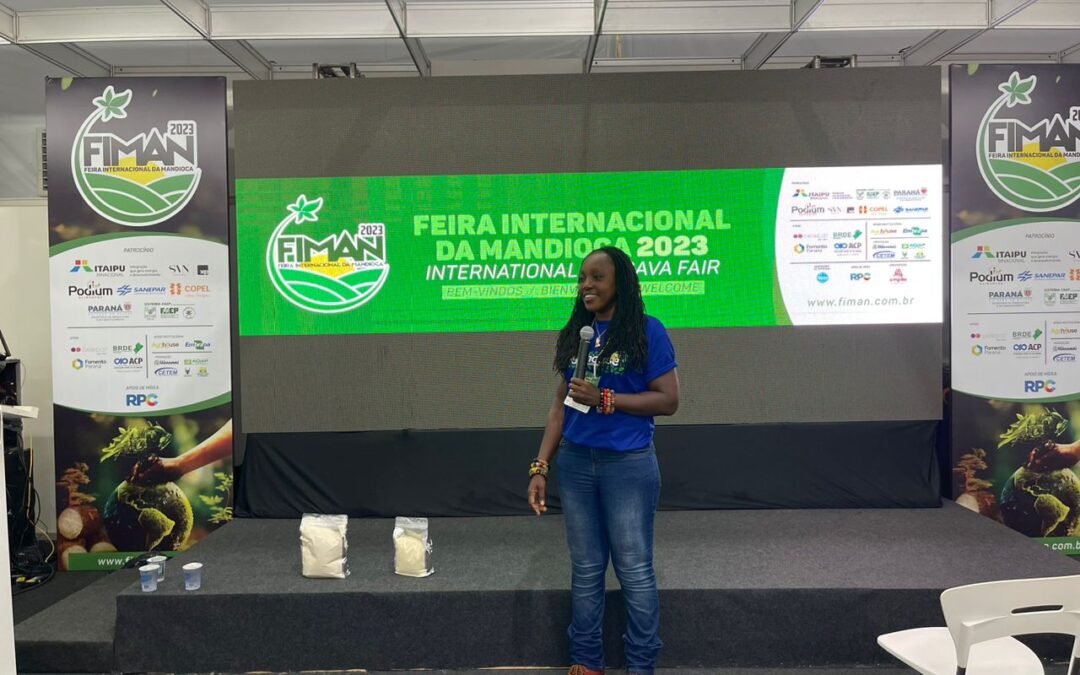
by Bismark | Dec 4, 2023 | Article, News
In an effort to elevate Ghana’s cassava industry onto the global stage, Alberta Nana Akyaa Akosa, the Executive Director of Agrihouse Foundation, delivered a compelling address to a global audience at the recently concluded International Cassava Fair in Brazil.
Addressing the topic “Securing Ghana’s Future Through Cassava” at the International Cassava Fair in Brazil, Ms. Akosa passionately advocated for a transformative approach to Ghana’s cassava industry, emphasizing the critical need to reshape the narrative around cassava cultivation in the country and the necessity for value addition.
The international cassava fair (FIMAN) 2023, organized by Podium Alimentos, was held from Tuesday, November 21st, to Thursday, November 23rd, 2023, aiming to foster knowledge exchange, networking, and collaborative exploration in the cassava sector. Ms. Akosa highlighted the crucial role of Ghana-Brazil collaboration in propelling advancements within Ghana’s cassava industry to significantly contribute to food security and economic growth in the country.
Ms. Akosa also shed light on the unique opportunities and challenges facing Ghana’s cassava industry, exploring avenues for collaboration with international partners, adoption of best practices, value addition, mechanization, and innovative strategies. The goal is to position Ghana as a major player in the global cassava market.
CELEBRATING CASSAVA: A DEFICIT IN GHANA: Despite its immense potential, Ms. Akosa highlighted the startling reality that Ghana is not celebrating cassava enough. The majority of cassava farming is directed towards domestic consumption, with limited emphasis on value addition. While there are noteworthy industries engaged in starch and alcohol production, the broader cassava sector struggles to secure the attention it deserves, particularly in comparison to the historically dominant cocoa and gold industry. With an annual production of 22 million metric tonnes, the time is ripe for a paradigm shift.
“Despite the abundance of opportunities in our cassava value chain, it remains underrated and under-celebrated. We all know how easy it is to grow cassava here in Ghana. Our country, our youth, our women, and the industry as a whole stand to gain more if we fully explore and embrace the vast potential within the cassava value chain, it is time for Ghana to mine Cassava as it mines Gold. Our country needs more cassava factories, farms, varieties, and equipment, such as planters, harvesters, dryers, and washers’’. ,” stated Ms. Akosa.
CULTIVATING CASSAVA’S HIDDEN RICHES: Ms. Akosa also underscored the need for a paradigm shift in Ghana’s agricultural focus. Cassava, often relegated to subsistence farming, stands on the precipice of a transformative revolution. The abundance of this resilient crop represents an untapped resource that, with the right attention, could blossom into a driving force for economic growth and food security.
With a production capacity that rivals cocoa, the time is ripe for Ghana to seize the opportunity and usher in a new era of cassava appreciation. Ms. Akosa’s call for a paradigm shift extends beyond the agricultural landscape; it beckons a recalibration of societal perceptions, urging Ghanaians to recognize the economic and nutritional potential that cassava holds.
While notable industries engage in starch and alcohol production, there remains immense scope for diversification. The versatility of cassava extends far beyond the traditional, offering a canvas for innovative products and industries. Encouraging value addition not only benefits local farmers but also positions Ghana on the global stage as a key player in the cassava market.
CHALLENGES AND OPPORTUNITIES: NAVIGATING THE CASSAVA LANDSCAPE: The Executive Director outlined the current challenges facing Ghana’s cassava industry. Traditional farming methods, predominantly through the use of cutlasses and hoes, remain prevalent. However, she noted a positive trend with an increasing number of women smallholder farmers contributing to the sector.
The existence of 32 cassava varieties developed by research institutions reflects the genetic diversity available for exploration,Yet challenges persist, A lack of machinery and equipment for processing, drying, and planting hinders efficiency. The knowledge gap for value addition and the absence of diverse recipes to encourage farmers to explore alternative uses of cassava contribute to the stagnation of the sector.
PROPOSED MEASURES: CATALYZING A CASSAVA REVOLUTION: Ms. Akosa laid out a comprehensive set of proposals to propel the cassava sector forward. This includes the urgent development and availability of domestic and edible seed varieties, the infusion of machinery and equipment at every stage of the production process, and a robust effort to address the knowledge gap hindering value addition. The call for capacity building and know-how to commercialize cassava effectively was underscored, along with increased investment in inputs and technology.
GOVERNMENT INTERVENTION: A significant portion the address was dedicated to advocating for government intervention. A strategic focus on cassava, the establishment of cassava farms, and support for farmers with improved seeds and markets are crucial steps. She urged the exploration of partnerships for industrialization and commercialization, positioning cassava as the next economic powerhouse akin to cocoa and gold. The initiative, she emphasized, would not only create more employment opportunities but also generate much-needed revenue.
LEARNING FROM BRAZIL’S CASSAVA SUCCESS STORY: In highlighting Brazil’s advanced cassava industry, Ms. Akosa provided a blueprint for Ghana’s future. Brazil’s utilization of cassava for starch, ethanol, and the creation of over 1000 food recipes showcase the boundless potential of this crop. The adoption of biogas production from cassava waste further illustrates the versatility that can be harnessed.
“Brazil’s cassava industry is budding and booming with a high level of value addition. This is an area Ghana can adopt to improve the value chains. Our women and beginner agribusinesses stand to gain a lot in terms of job creation by adding value to cassava. Brazil currently has over 1000 cassava food recipes. Ghana’s climate is much similar to Brazil and I am confident, transferring of knowledge and know-how in cassava food nutrition recipes will be an added value.
According to her, the Cassava industry is a huge jackpot in Brazil. Brazilian Agric manufacturers have been able to develop and manufacture equipment, such as cassava dryers, washers, planters, harvesters, etc., that enhance speed and bring about efficiency. This is a big leap for Ghana, should we be able to partner with Brazilian Manufacturers to develop machinery and equipment as these for our sector.
CONCLUSION: A TRANSFORMATIVE VISION FOR GHANA’S CASSAVA FUTURE: Ms. Akosa concluded her address with a powerful call to action. Beyond showcasing Ghana’s cassava sector, the initiative seeks to foster connections and explore sustainable business opportunities within the dynamic global cassava value chain. With the potential for Ghana to emerge as a key player in the international cassava market, the time is ripe for a Cassava Revolution—a transformative vision to secure Ghana’s agricultural future.
‘’ As we celebrate our agricultural diversity, let us not overlook the golden potential that cassava holds in propelling our nation towards a more sustainable and prosperous future. It is my desire to see Ghana mining Cassava in the next three to five years. Partnering with Brazilian Cassava players is one sure step to get there. We need the exchange of ideas, transfer of knowledge, and all that is needed to grow the sector.’’ She concluded

by Bismark | Nov 23, 2023 | Article, Press Release
The Executive Director of Agrihouse Foundation, Alberta Nana Akyaa Akosa, is poised to address a global audience at the International Cassava Fair in Brazil today, Thursday, November 23rd, on the topic “Leveraging International Platforms to Commodify Cassava in Ghana.”
Emphasizing the significance of commodifying cassava in Ghana, Ms. Alberta Nana Akyaa Akosa’s keynote address will underscore the pivotal role of international collaboration in catalysing advancements within Ghana’s cassava industry. This insightful discourse aims to position Ghana as a key player on the global agricultural stage.
This strategic initiative goes beyond showcasing the ingenuity within Ghana’s cassava sector; it also aims to foster invaluable connections and explore sustainable business opportunities within the dynamic global cassava value chain.
Ms. Akosa, will also shed light on the unique opportunities and challenges facing Ghana’s cassava industry, exploring avenues for collaboration with international partners, the adoption of best practices, value addition ,mechanization and the implementation of innovative strategies to position Ghana as a major player in the global cassava market.
This focus on the immense potential of cassava as a cash crop aims to contribute significantly to food security and economic growth in Ghana.
Ms. Alberta Nana Akyaa Akosa ,will also delve into how Ghana can leverage the International Cassava Fair platform, to enhance value addition in processing transportation and mechanization among others .
Moreover, she will emphasize the collaborative potential of the International Cassava Fair in facilitating capacity building. This includes bringing resource persons from Brazil to Ghana, imparting valuable knowledge and skills.
Attendees at the International Cassava Fair will have the opportunity to gain valuable insights into the present and future of Ghana’s cassava industry and the crucial role that collaboration on the global stage can play in its success. The event promises to be a milestone in the ongoing efforts to position Ghana as a key player in the international cassava market.
The International Cassava Fair (FIMAN), organized by Podium Alimentos in Brazil which opened on Tuesday, November 21st and expected to end on Thursday, November 23rd, 2023, represents a pivotal moment for knowledge exchange, networking, and collaborative exploration in the cassava sector .
Demonstrating a steadfast commitment to showcasing Ghana’s cassava industry on the global stage, Agrihouse Foundation, the official franchise holder for the International Cassava Fair in Ghana, lead a delegation of 17 esteemed figures across diverse sectors of the Ghanaian agricultural landscape at the International Cassava Fair in Paranavaí, Brazil.
This fair provides a unique platform for the Ghanaian delegation, comprising visionaries from various segments, including farmers, processors, input dealers, Farmer-Based Organizations (FBOs), aggregators, and other key players in the agricultural value chain.
the Ghanaian delegation are actively participating as exhibitors, engaging in illuminating Business Matchmaking sessions, and pursuing collaborative initiatives with international counterparts. This multifaceted approach underscores the delegation’s dedication to not only showcasing the present capabilities of Ghana’s cassava industry but also fostering future growth through strategic partnerships.
This diverse and influential delegation not only serves as ambassadors for Ghana’s cassava industry but also positions the nation as a key player in the global agricultural landscape.
As Agrihouse Foundation continues to lead the charge, the future of Ghana’s cassava sector looks promising, marked by innovation, collaboration, and sustainable growth.
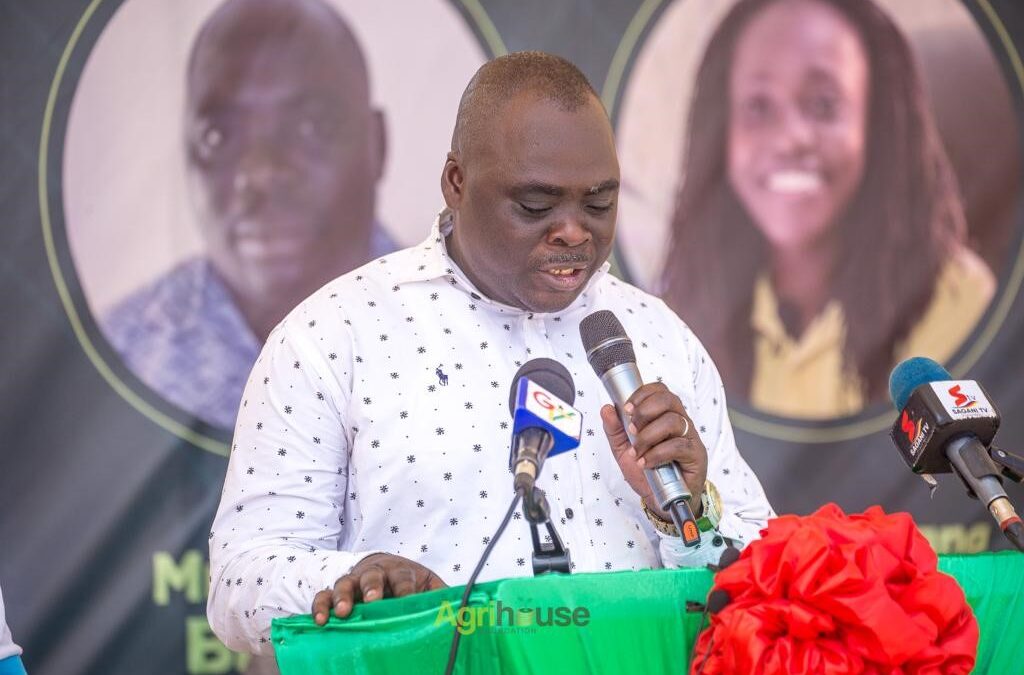
by Bismark | Nov 8, 2023 | Article, Press Release
Recognizing agriculture as a vital lifeline that sustains populations, economies, and National development, Reuben Binpori, the Inclusive Business Models Expert for the European Union Ghana Agricultural Programme (EUGAP) and the Market-Oriented Agricultural Program in North West Ghana (MOAP NW), passionately urged the agricultural sector to redouble its efforts in constructing a more sustainable and resilient agricultural framework.
Speaking at the 13th Annual Pre-Harvest Agribusiness Conference and Exhibition’s closing ceremony held at the Agrihouse Agri-Village Learning, Training, Innovation, and Demonstration site in Kudula, Northern Region, Mr. Reuben Binpori emphasized the urgent need for renewed purpose and commitment in cultivating a more sustainable and resilient agricultural sector. This imperative is especially pressing in the face of escalating concerns regarding climate change and food security. Adopting sustainable agricultural systems is crucial.
Mr. Binpori highlighted significant advancements made by EUGAP, noting that over 70,000 farmers, agro-input dealers, and agro-processors have undergone capacity-building initiatives. These efforts have heightened the necessity for market systems, certifications, and the promotion of integrated business models to fortify the sector.
“As development partners in Ghana’s agricultural sector, our focus lies in creating robust, competitive, and sustainable platforms that interconnect value chains. Through these platforms, our aim is to achieve higher quality and quantity of farm produce reaching markets, ensuring collective food security, and providing improved access to capital for smallholder farmers and other value chain actors,” expressed Binpori.
“Sustainable agriculture is not a choice but a necessity. We must wholeheartedly embrace innovative solutions, from precision farming techniques to organic farming methods, to ensure a sustainable future for generations to come,” he added
He also highlighted that the European Union Ghana Agricultural Programme continues to support their partners with resources and practical knowledge, empowering them to promote and adopt intelligent climate and good agricultural practices. Additionally, numerous initiatives introduced by EUGAP through the MOAP-NW and REACH component project continue to have a significant impact on the agricultural sector.
Throughout the 3-day 13th annual pre-harvest conference and exhibition, a diverse array of experts shared insights encompassing sustainable business and farming practices, climate-sensitive agricultural production, and technological advancements. He used the opportunity to call for more collaborations among farmers, researchers, policymakers, and industry players to drive meaningful change within the agricultural industry.
Expressing deep gratitude, he commended Agrihouse Foundation for their enriching contributions in improving the agricultural sector through ,the annual pre-harvest agribusiness conference and exhibition .
He also encouraged farmers and actors in the agricultural value chain to embrace a renewed sense of purpose and commitment, marking a vital step towards establishing a more sustainable and resilient agricultural sector.
BY:AGRIWATCH REPORTER
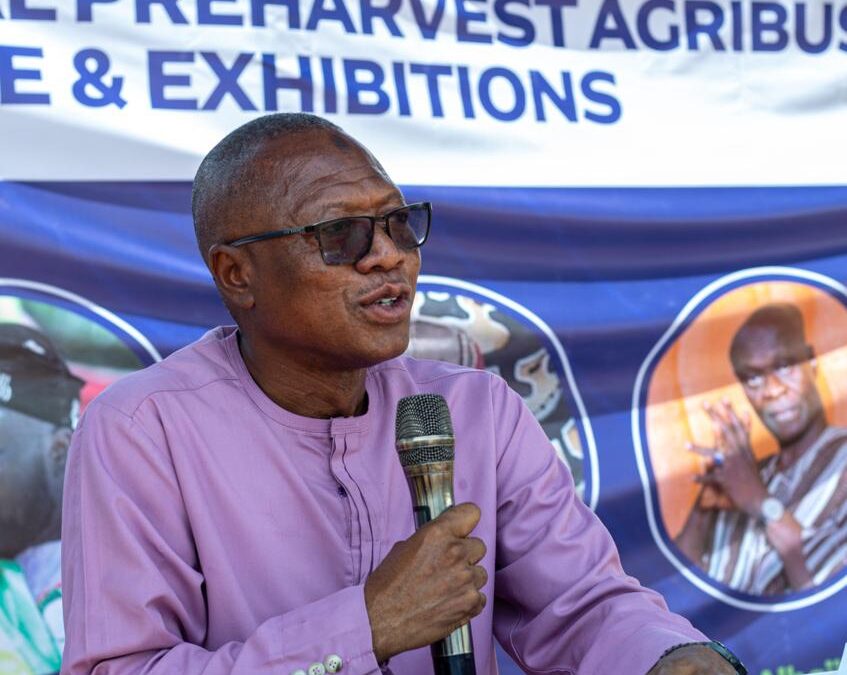
by Bismark | Nov 8, 2023 | Article, Press Release
Alhaji Alhassan Issahaku, the Chief Director of the Northern Regional Coordinating Council, speaking on behalf of the Northern Regional Minister Hon. Shani Alhassan Saibu, at the 13th Annual Pre-Harvest Agribusiness Conferences and Exhibition organized by Agrihouse Foundation in Kudula, Tamale. conveyed an emphatic call to the youth to take an active role in agribusiness, underscoring the need for robust youth engagement in agriculture, citing it as a pivotal cornerstone of the economy and a primary source of livelihood for a significant proportion of the population.
Addressing participants, at the 13th annual pre-harvest agribusiness conference, held under the theme: connecting the unconnected the farmer, the input dealer and the processor, Alhaji Alhassan issahaku elucidated on the compelling reasons behind the advocacy for greater youth participation in agribusiness. Central to his address was the economic contribution that the young generation could offer.
He emphasized how the active involvement of the youth in agriculture could markedly enhance regional economic development. Youth engagement, he emphasized, could bolster employment opportunities, foster entrepreneurship, and augment income, thereby advancing the economic landscape of the region.
Upholding Food Security and Technological Innovation
The Chief Director of the Northern Regional Coordinating Council emphasized the vital role of the younger generation in maintaining consistent food production. He underscored that their active participation could bring innovative farming practices into effect, meeting the burgeoning demands of an ever-growing population. Further, he pointed out the potential for technological innovation, highlighting that the tech-savvy skills of the youth could revolutionize traditional farming methods, resulting in enhanced productivity and efficiency in the agricultural sector.
Stressing that the youthful demographic brings fresh outlooks and environmental awareness, integral in promoting eco-friendly agricultural practices. The sustainability of farming, he suggested, rests on the shoulders of the younger generation who are well-equipped to adopt practices that foster long-term environmental balance.
He also deliberated on the significance of youth engagement in addressing rural development. By encouraging the youth to take part in agriculture, rural areas can be revitalized, promoting economic opportunities and curbing mass migration to urban centres.
BY:AGRIWATCH REPORTER
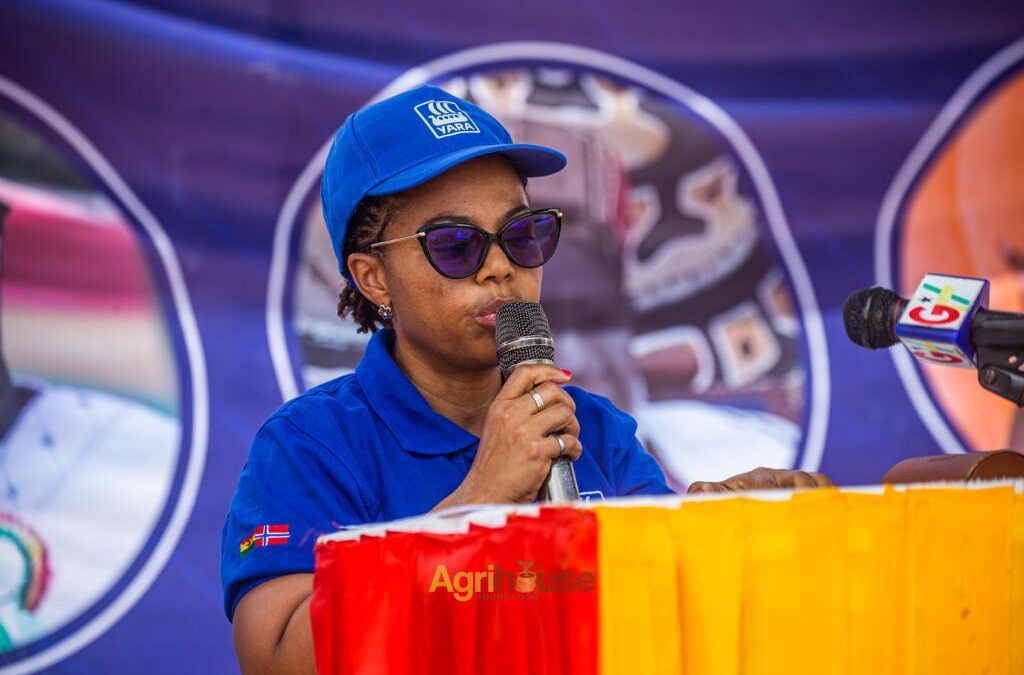
by Bismark | Nov 1, 2023 | Article, News
Yara Ghana ,has once again demonstrated substantial progress in advocating for the efficient and effective use of fertilizers by spearheading farmer training and practical demonstrations at the 13th annual Pre-Harvest Agribusiness Conference and Exhibition.
Speaking at the opening ceremony of the 13th annual Pre -Harvest Agri-Business Conference and Exhibitions hosted by Agrihouse Foundation at the Agrihouse Agri-Village Learning Training Innovation and Demonstration site in Kudula on Tuesday, October 26th, 2023, Ms. Theresa Randolph, the Country Director for Yara Ghana, underscored the Yara Ghana’s dedication to empowering farmers with the knowledge and tools essential for optimal fertilizer utilization.
Ms. Randolph highlighted the crucial role of adequate training and practical demonstrations in securing the best outcomes for farmers.
“Yara is committed to supporting Ghanaian farmers through vital training and practical demonstrations on the effective application of fertilizers. We firmly believe that equipping farmers with the right knowledge is pivotal in improving agricultural practices and increasing crop yields,” stated Ms. Randolph.
The training and demonstration sessions orchestrated by Yara Ghana at the 13th annual pre-harvest agribusiness conference and exhibitions aimed at providing farmers with practical skills and knowledge to optimize fertilizer usage, promoting cost-effectiveness and environmentally sustainable agricultural practices.
Yara’s proactive approach in farmer education and empowerment signifies a broader commitment to fostering a more knowledgeable and robust agricultural community, promising a positive impact on Ghana’s agricultural landscape.
The event witnessed the active participation of numerous farmers, agricultural experts, and stakeholders engaging in interactive sessions, workshops, and live demonstrations aimed at illustrating best practices in fertilizer application.
She also added that ,Yara has continually supported food production and farmer profitability, evident in the results from farmers adopting Yara’s crop nutrition solutions. Apart from providing quality, crop-targeted fertilizer solutions, Yara prioritizes farmer trainings and demonstrations to ensure the effective and efficient use of fertilizers for quality food production while preserving the planet, fostering a nature-positive food future.
”Yara’s commitment to the agricultural sector growth transcends farming; it encompasses the entire value chain – connecting farmers to inputs, markets, financing, and more. The company’s role in supporting programs that link the agriculture value chain has consistently yielded impactful results. The Preharvest event presents yet another opportunity to make a significant impact”.she added.
The annual Pre -Harvest Agri-Business Conference and Exhibitions serve as a platform for industry stakeholders, farmers, and experts to exchange ideas and showcase innovative agricultural practices. Yara’s proactive engagement in this event underscores their dedication to enhancing agricultural productivity and sustainability in Ghana.
BY; AGRIWATCH REPORTER













